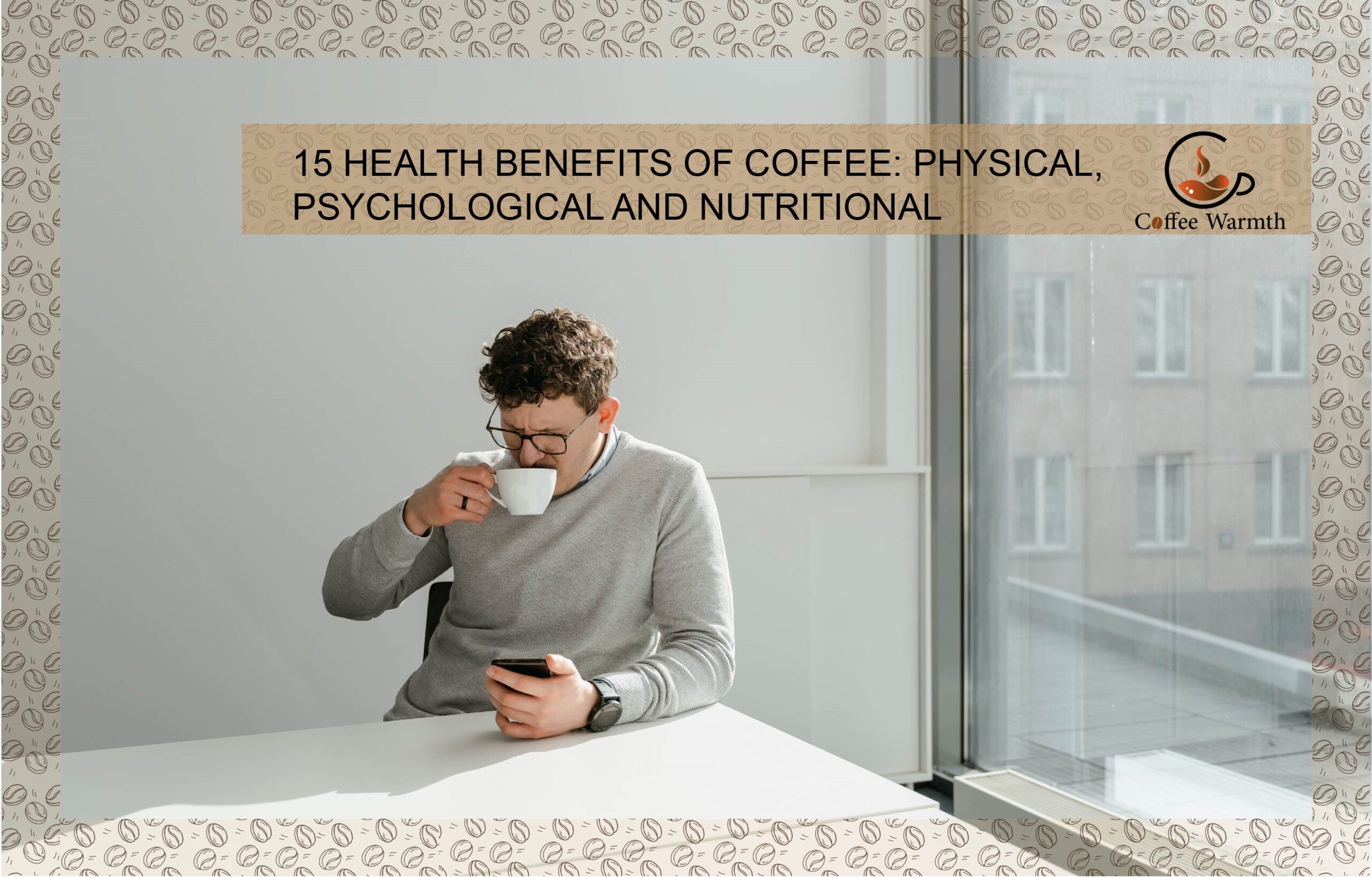Drinking coffee is a hot beverage derived from roasted and ground coffee beans through different coffee brewing methods. Drinking coffee has a dark color, bitter taste, and fruity or flowering aroma depending on the type of coffee beans and roast.
Drinking coffee contains caffeine which is a crystalline alkaloid and a powerful stimulant of the central nervous system. According to the Journal of the American Dietetic Association, caffeine in coffee is distributed in all tissues and organs of the body.
Caffeine reaches the brain and blocks adenosine, a neurotransmitter responsible for sleep. This improves alertness and boosts energy levels. High energy levels due to caffeine enhances physical performance by improving power, endurance, and balance. Drinking coffee an hour before activity acts as an ergogenic aid, increases energy, reduces fatigue, and helps you reach peak exercise performance.
Caffeine in drinking coffee promotes alertness and high energy levels which improve brain functioning in activities like thinking and learning. Drinking coffee also helps perform dual tasks, improves information processing and short-term memory.
Drinking coffee contains nutritionally beneficial nutrients like calcium, potassium, magnesium, phosphorus, and sodium. Coffee provides vitamins such as vitamin B2, vitamin B3, and vitamin B5. People drink coffee to obtain its nutritional value and stimulate their nervous system for better physical and psychological performance.
As a result, questions arise regarding how much coffee you can drink in a day, amount of caffeine in one cup of coffee, the benefits of drinking coffee in the morning, the benefits of drinking water after a meal, the benefits of drinking coffee before bed, the benefits of drinking coffee in men and women, and whether drinking black coffee gives health benefits or not. In this article, we will evaluate the 15 health benefits of drinking coffee shown in this diagram.
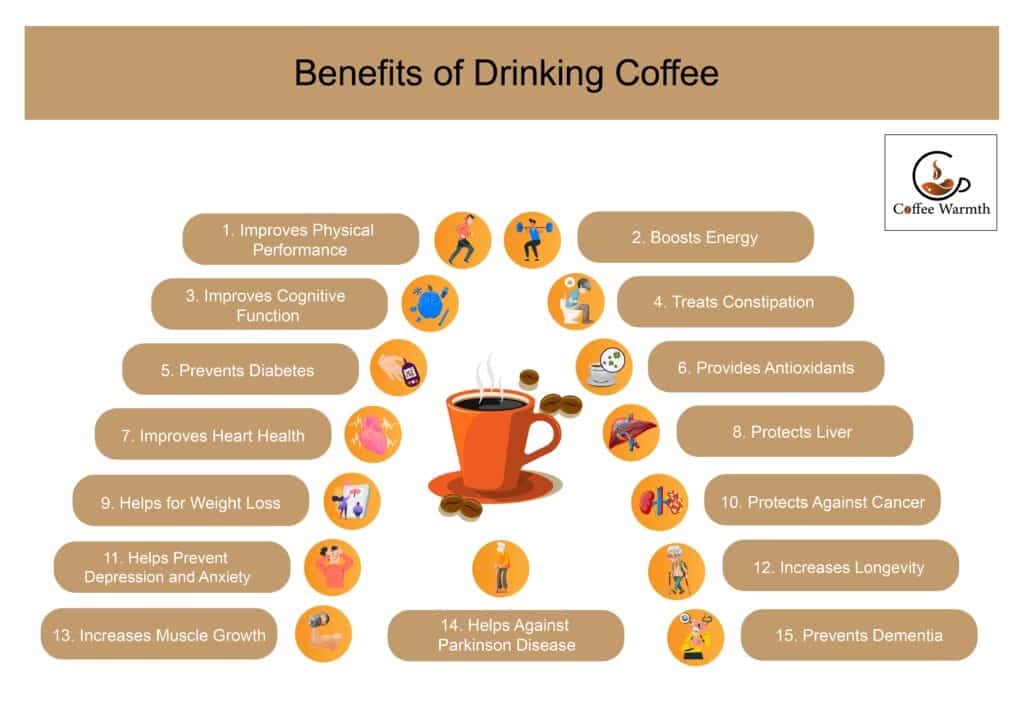
1. Improves Physical Performance
Physical performance, from a medical view, objectively measures whole body function related to mobility. Physical performance is measured through outcomes like endurance, power, balance, and gait. Additionally, input from organs and systems such as the musculoskeletal system, neuromuscular system, and cardiopulmonary affect all the outcomes.
Considerable evidence shows the positive effect of drinking coffee on physical performance and improved response in physical performance activities like walking, running, swimming, and cycling etc. Coffee is used as an ergogenic aid by athletes to enhance these outcomes. Jozo Grgic from Institute for Health and Sport (IHeS), Melbourne University concluded that caffeine in drinking coffee is ergogenic for physical performance components like aerobic endurance, power, and exercise speed.
According to the British Journal of Sports Medicine, drinking coffee 60 minutes before running improves the running time and speed by increasing the VO2 max. An increase in VO2 max reduces perceived exertion after running. Jozo Grgic, in Journal of Nutrition & Food Science, shows the beneficial ergogenic effects of coffee ingestion on swimming time.
Professor Ben Desbrow, a practicing Dietitian from Australia, says drinking 2 cups or 16 fl.oz. of coffee having 140-200 mg of caffeine, or about 95 mg on average before a workout boosts physical performance.
Since even a small amount of coffee has an impact on physical performance, coffee can be used in substantial quantities as an ergogenic aid to achieve peak physical performance.
2. Boosts Energy
Energy, from a medical point of view, means the ability or power to perform physical and mental activities. Human body regulates energy through dietary nutrients namely carbohydrates, lipids, and proteins and chemical messengers called hormones. Hormones play a key role in balancing your energy levels. Hormones responsible for increasing energy are dopamine, cortisol, and adrenaline.
Caffeine in coffee is a central nervous system stimulant which increases dopamine, cortisol, and adrenaline levels. Dopamine, a neurotransmitter, boosts energy by stimulating nerve cells and making you happy. On the other hand, cortisol and adrenaline improves energy levels by activating the ‘fight or flight’ response. This stressful condition increases heart rate, blood pressure, and blood glucose levels which gives you energy to fight off any situation.
The diagram shows how drinking coffee boosts energy after activating ‘fight or flight’ response.
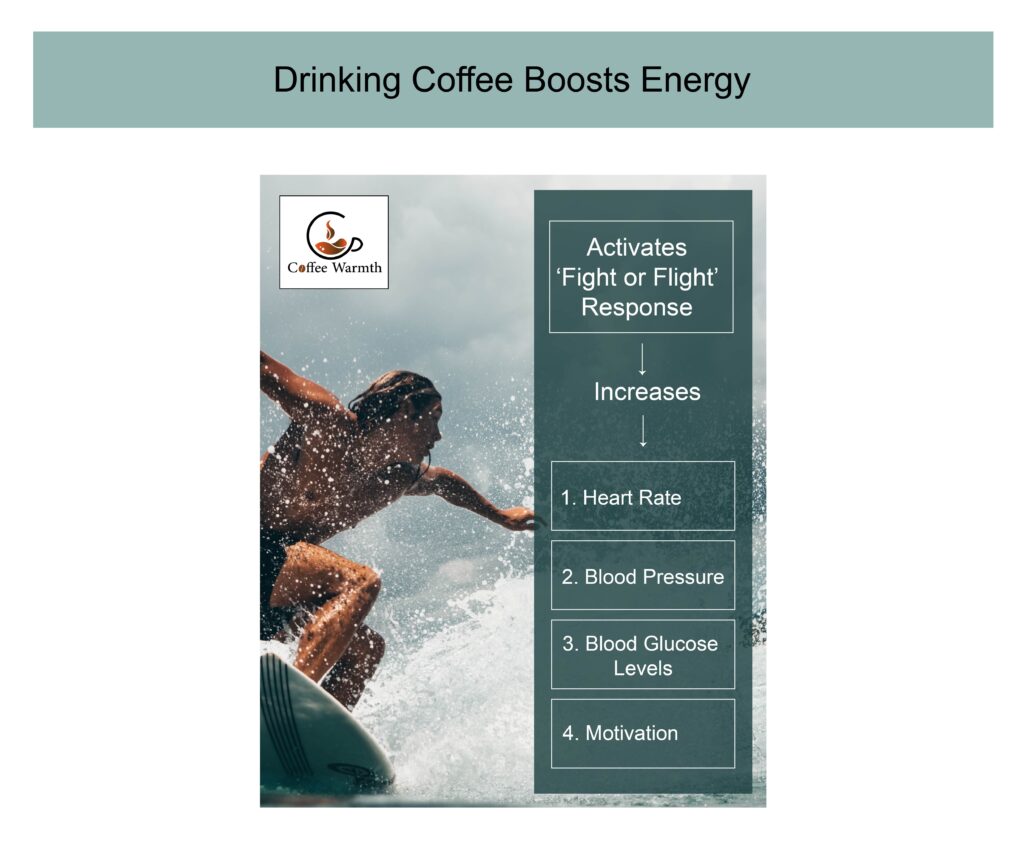
According to the Journal of Medicinal & Aromatic Plants, drinking 2 cups (16 fl.oz.) of coffee boosts energy for brain and body functions. A study published in Journal of Basic and Clinical Physiology and Pharmacology explains that it takes about 60 mins for caffeine in coffee to distribute fully in the body and provide necessary energy for your tasks.
Moreover, not drinking coffee or drinking <1 cup (<8 fl.oz.) of coffee per day reduces ability to perform physical and mental activities, says Dr. Luciana Torquati from University of Exeter.
3. Improves Cognitive Function
Cognitive function refers to mental activities including thinking, learning, reasoning, remembering, problem solving, decision making, and attention.
Drinking coffee provides beneficial effects on cognitive function. Caffeine in coffee acts as a central nervous system stimulator by blocking the adenosine receptors. Adenosine receptors blockage results in activation of certain neurotransmitters like dopamine, acetylcholine, and adrenaline. Dr. Hiske van Duinen, of University Medical Center Groningen (UMCG), states that high levels of neurotransmitters increases alertness and concentration.
Carolyn F Brice in her study concludes that drinking coffee helps in visual-information processing, dual-task management, and psychological reaction time. Drinking coffee 45-60 minutes prior to these activities help in enhancing alertness and vigilance.
Another common benefit of drinking coffee on cognitive function is improvement in short-term memory. A study in the Metabolic Brain Disease found a positive impact on short-term memory after using Arabica and Robusta coffee beans.
The diagram shown lists the benefits of drinking coffee boosts cognitive function.
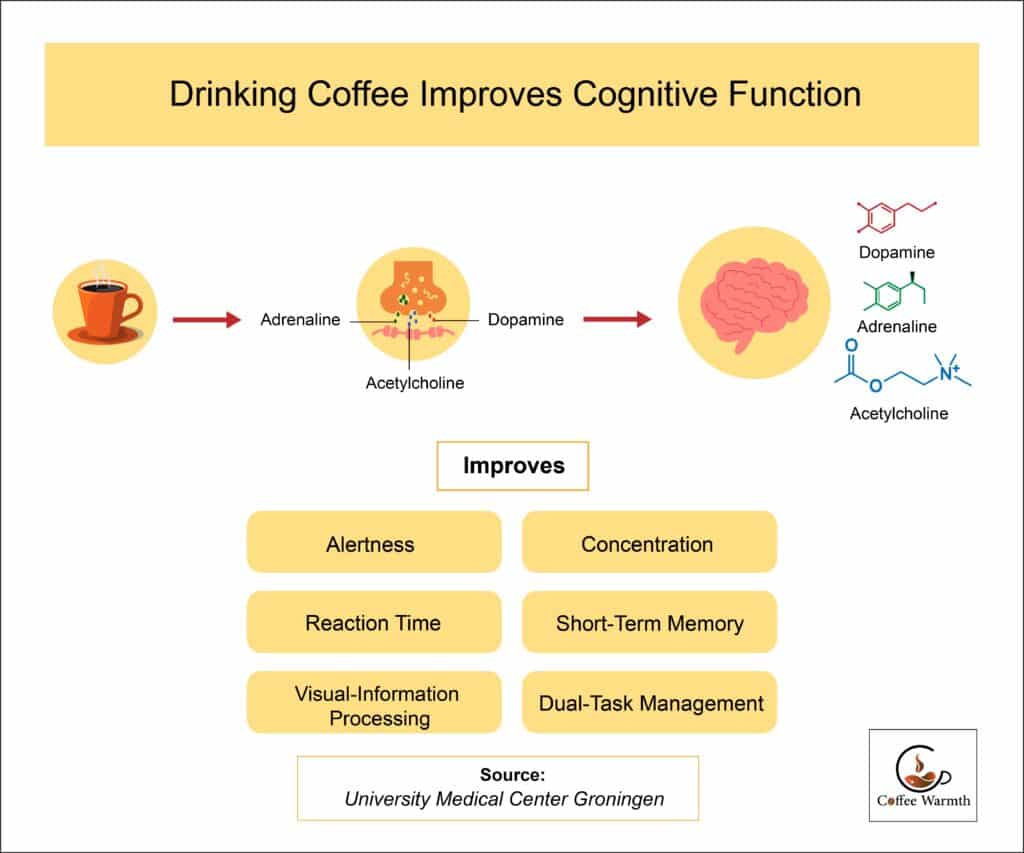
4. Treats Constipation
Constipation refers to infrequent or reduced bowel movements, hard or dry stools that are difficult to pass, increased water absorption in the colon, and a feeling of an unempty gut.
Drinking coffee treats constipation by stimulating the colon and increasing the bowel movements. Coffee causes gut and colonic contractions and moves the poop towards the rectum and anus.
Drinking coffee in the morning can help relieve constipation as colonic motility increases after waking up. According to Dr. Christine Lee from Willoughby Hills Family Health Center, the gut is prone to more movement in the morning. This means a cup of coffee can make you go for an early bathroom trip.
Drinking both caffeinated and decaffeinated coffees are equally beneficial for treating constipation. Caffeinated coffees are 23% more potent to decaffeinated ones. This proves that caffeine is not the only compound in coffee to cause the urge to defecate.
According to Professor Amaia Iriondo De Hond from University of Madrid, drinking coffee promotes the urge to poop within 4 minutes of intake. Drinking 8 fluid ounces of coffee or one cup of brewed coffee is enough to relieve constipation.
5. Prevents Type 2 Diabetes
Type 2 diabetes mellitus is a heterogeneous condition characterized by high blood (glucose) sugar levels due to decreased insulin production, reduced insulin sensitivity, and increased insulin resistance. Insulin is produced by the pancreatic beta cells that regulate blood sugar levels.
Drinking coffee decreases risk of type 2 diabetes by preserving pancreatic beta cells through enhanced cellular mechanisms. Dr. Muhammad Sajid Hamid Akash from Government College University, Faisalabad says that antioxidants in coffee increases insulin sensitivity and secretion, and reduces insulin resistance and inflammation.
The diagram illustrates how drinking coffee prevents prevents type 2 diabetes according to the results of aforesaid study.
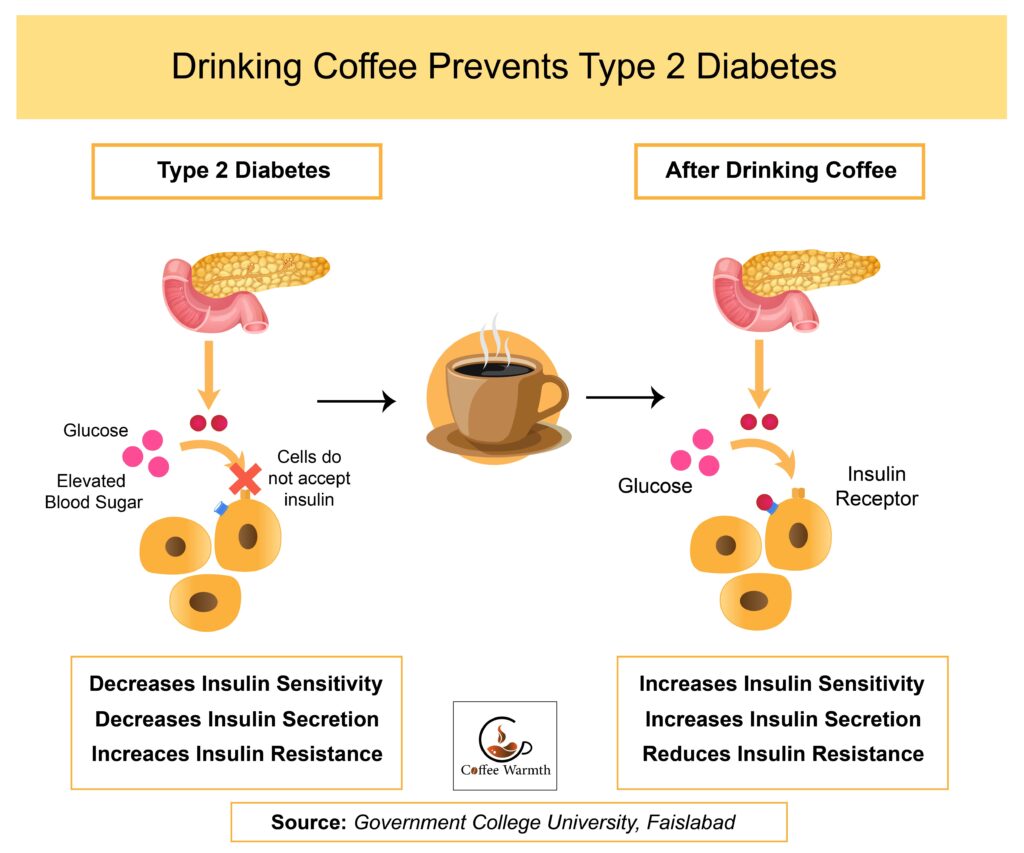
Substantial evidence indicates that drinking coffee regularly prevents type 2 diabetes mellitus. A review published in Journal of American Medical Association observing 457,922 individuals concluded that drinking 3-4 cups (24-32 fl.oz.) of coffee per day was associated with 25% lower risk of type 2 diabetes mellitus than drinking 0-2 cups (0-16 fl.oz.) of coffee per day.
Additionally a study in the Journal of Internal Medicine also states that drinking 3-4 cups (24-32 fl.oz.) of coffee decreased risk of type 2 diabetes mellitus by 50–70%.
6. Provides Antioxidants
Antioxidants are substances that fight the free radicals in your body. Free radicals are unstable atoms that can damage body cells causing aging, heart disease, type 2 diabetes mellitus, and cancer. It is further illustrated in the image below.
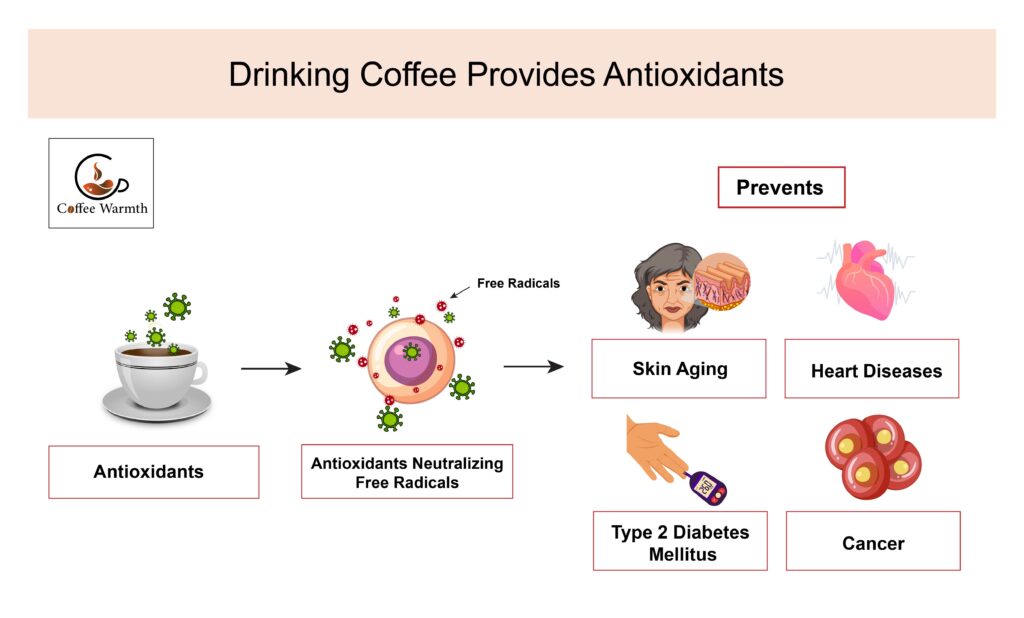
Drinking coffee is the 11th richest dietary source of antioxidants. Drinking one cup (8.fl.oz.) of coffee provides 200–550 mg/cup of antioxidants. Studies show that drinking coffee contributes 79% of the total dietary antioxidants in the Western diet. Drinking coffee has powerful antioxidants like hydroxycinnamic acids and polyphenols. According to the Journal Cosmetics, polyphenols such as chlorogenic acids, ferulic, and caffeine in coffee have high antioxidant amounts which prevent skin aging by collagen production and cell proliferation.
The National Cancer Institute explains that dietary and exogenous antioxidants prevent free radical damage linked with cancer. A study ”Coffee and cancer risk: A meta-analysis of prospective observational studies” published in Nature Journal concluded that drinking coffee is associated with reduced risk of oral, pharynx, liver, colon, prostate, endometrial cancer, and melanoma.
Another benefit of antioxidants from drinking coffee is that it prevents heart disease. A study in Journal of the American Medical Association concludes that dietary antioxidants counters atherogenesis by neutralizing free radicals and preventing lipoprotein oxidation.
7. Improves Heart Health
Drinking coffee improves cardiovascular health which refers to the health of heart and blood vessels. A healthy cardiovascular system pumps blood throughout the body providing oxygen and nutrients to the tissues. Contrarily, cardiovascular disease relates to diseases of heart and blood vessels like coronary heart disease, heart failure, cardiac arrhythmias, and stroke.
Caffeine found in coffee increases the endothelial function which reduces the risk of cardiovascular diseases. A recent study published in the Journal Trends in Cardiovascular Medicine recommends drinking 2-3 cups (16-24 fl.oz.) of coffee everyday to prevent coronary heart disease, heart failure, cardiac arrhythmias, and stroke. Another research in the American Heart Association Journal suggests that drinking 3 or more cups (>24 fl.oz) of caffeinated coffee decreases the risk of heart failure significantly as compared to 0-2 cups (0-16 fl.oz.) of coffee.
Dr. David Chieng from Alfred Health proposes that drinking 6 cups (48 fl.oz.) of coffee per day reduces the risk of stroke. Caffeine in coffee enhances endothelial function and maintains lipid and glucose profile to lower the incidence of cerebrovascular accidents (CVA).
8. Protects Liver
Drinking coffee protects the liver by maintaining its homeostatic function of detoxification, metabolism of nutrients, bile production, immune function, and enzyme activation.
The benefit of drinking coffee in patients with liver disease is improvement of liver enzymes. Liver enzymes (ALT, AST, and GGTP) are associated with lower incidence of liver cirrhosis and fibrosis. Dr. Sammy Saab, gastroenterologist, suggests that drinking more than 2 cups (16 fl.oz.) of coffee daily reduces the rate of chronic liver disease and cirrhosis by 50%. Another study in the Journal of Gastrointestinal and Liver Diseases recommends drinking 3 or more cups (>24 fl.oz) of coffee a day to gain maximal liver protection.
The diagram illustrates how drinking coffee protect liver and regulate its function.
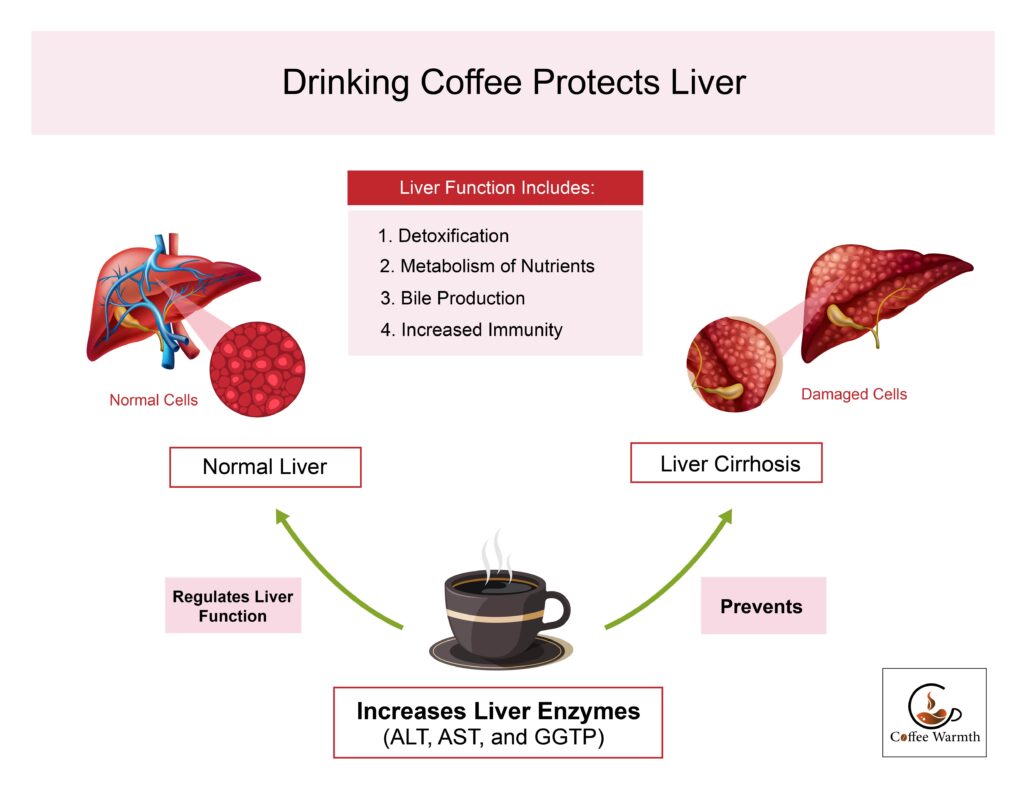
According to the study in Journal of the National Cancer Institute, drinking coffee reduces risk of liver cancer by 40-50%. Caffeine and phenolic acids in coffee stop hepatocellular carcinogenesis directly.
Besides liver cancer, drinking coffee daily decreases liver disease progression of Hepatitis C (HCV) patients. Coffee minimizes oxidative DNA damage and procollagen III deposition which prevents liver fibrosis in HCV patients.
9. Helps for Weight Loss
Weight loss is defined as decrease in body weight through voluntary or involuntary circumstances. Drinking coffee helps weight loss by increasing metabolism, energy expenditure, thermogenesis, reducing appetite and consequently fat stores.
Drinking coffee increases metabolic rate which facilitates more energy expenditure, hence helping you lose weight. A cup of coffee 60 minutes before exercise burns more fats and calories due to peak caffeine activity at this time. Caffeine and chlorogenic acid in coffee increase metabolic rate and use stored fat, according to ‘Plus One’ Journal.
Another way drinking coffee helps shed pounds is by suppressing appetite. Drinking a cup of coffee in the morning or before meal time releases leptin hormone which reduces hunger. A reduction in calorie intake depletes adipose storage as your body utilizes stored fat for energy which helps in weight loss.
10. Protects against Cancer
Cancer refers to a condition caused due to uncontrolled cell division that can spread to other parts of the body. Drinking coffee protects against cancer by its antioxidant and anti-inflammatory properties.
The antioxidant and anti-inflammatory properties of coffee counters oxidative stress and inflammation and prevents DNA damage that can lead to formation of cancerous cells. An article in Biomed Research Journal shows that drinking coffee regularly prevents prostate cancer due to the positive effects of antioxidants in coffee.
Drinking coffee has a slight protective effect against breast cancer, according to a study published in the European Journal of Nutrition. The same study found that coffee consumption after breast cancer diagnosis and surgery reduces the occurrence of negative effects early in the disease.
A study published in Cancer Epidemiology in 2020 studied 107,061 coffee drinkers from the United States. The study states that drinking more than 2 cups(16 fl.oz.) of decaffeinated coffee a day reduces the incidence of colon, rectal, and colorectal cancers.
Luis Gabriel Parra Lara, from ICESI University, concludes that drinking 7 kg coffee per year reduces risk of stomach cancer and mortality of stomach cancer.
Drinking coffee also protects against brain cancer in the Asian population according to a review published in the World Journal of Surgical Oncology.
11. Helps prevent Depression
The American Psychiatric Association (APA) describes depression as a serious medical illness that causes sadness and/or a loss of interest in activities.
Drinking coffee prevents depression by reducing nerve cell inflammation in the brain. Coffee contains large amounts of polyphenols like caffeine, chlorogenic acid, and ferulic acid which disrupt the pathogenesis of depression. Caffeine in drinking coffee also temporarily elevates mood in depressed people by increasing dopamine production.
The diagram shows how drinking coffee helps prevent depression through polyphenols and dopamine production.
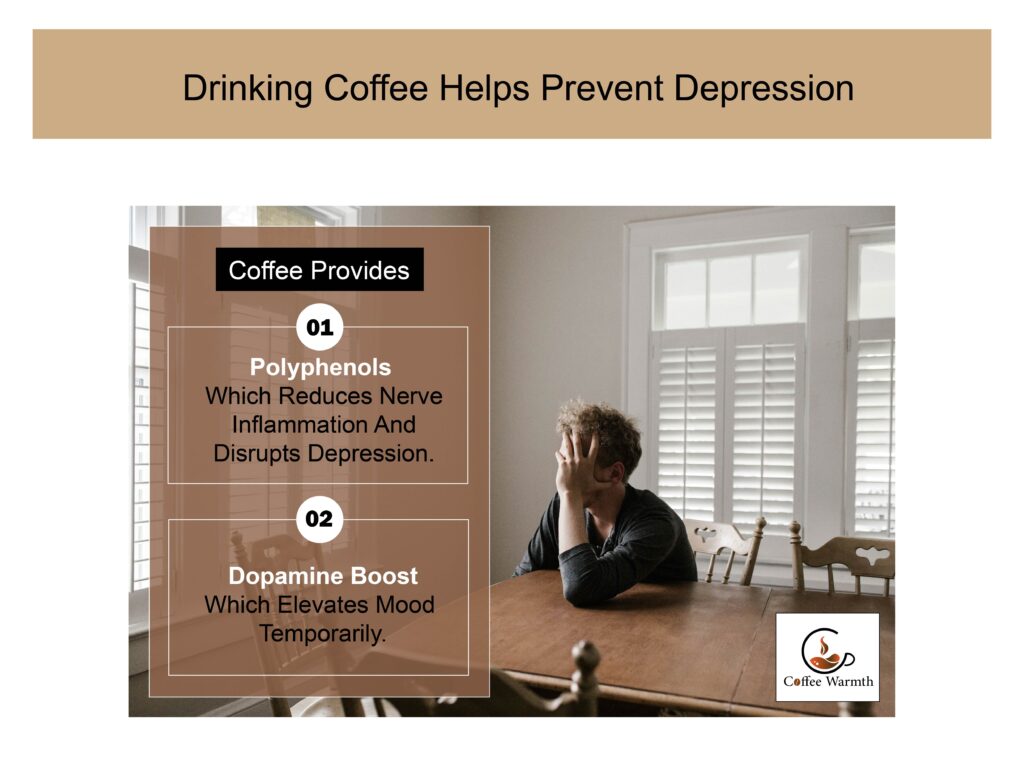
According to the Journal of the American Medical Association, drinking 4 cups(32 fl.oz.) of caffeinated coffee per day prevents depression, compared to drinking one or less cup of coffee a day. Increasing the coffee consumption to 6-7 cups (48-56 fl.oz.) per day can decrease suicide cases caused by depression.
The Korean National Health and Nutrition Examination Survey on 10,177 people found out that drinking 3 cups of coffee per day prevents the development of clinical depression.
12. Increases Longevity
Longevity, from a medical point of view, means the length of the life span independent of the biological aging process. Drinking coffee helps extend longevity through its numerous beneficial effects.
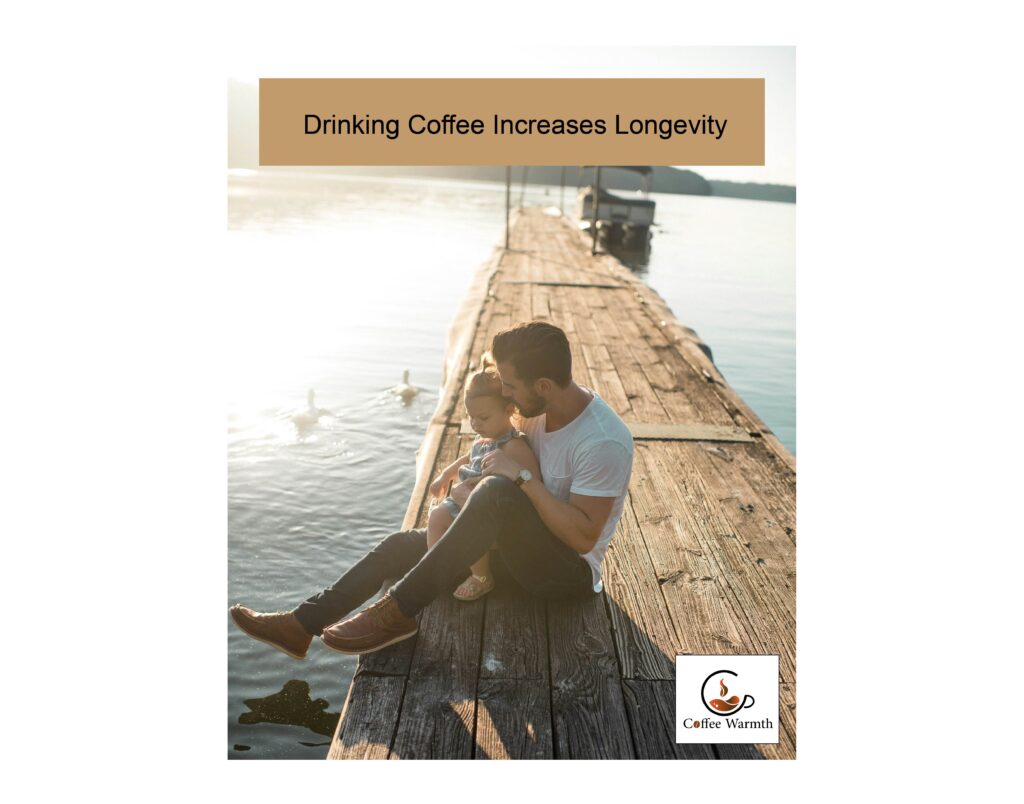
Drinking coffee increases longevity by preventing and reducing the dangerous effects of chronic diseases like type 2 diabetes mellitus, cancer, liver cirrhosis, and cardiovascular diseases. Coffee reduces the risk of these chronic diseases by increasing antioxidants, anti-inflammatory factors, reducing insulin resistance, and improving endothelial function. Drinking coffee also improves longevity by lowering the risk of neurodegenerative disorders like Parkinson’s and dementia.
A research published in BMC Medicine followed 498,158 participants over 4 years in the UK to find mortality risk in coffee drinkers. Those drinking 2 or more cups (>16 fl.oz.) of coffee daily had reduced all-cause and coronary vascular disease mortality risk. Meanwhile, drinking 8 or more cups (>64 fl.oz.) a day had higher all-cause and digestive disease mortality.
Another study in the Journal of American Heart Association suggests drinking 3-6 cups of coffee per day improves lifespan by reducing the risk of cardiovascular mortality.
13. Helps against Parkinson’s
The National Institute on Aging defines Parkinson’s disease as a brain disorder that causes unintended or uncontrollable movements characterized by low levels of dopamine.
The relationship between coffee and Parkinson’s is well understood through the action of caffeine in the brain. Caffeine acts as adenosine antagonist and increases dopamine levels. High dopamine levels enhance attention and vigilance as well as improve symptoms like uncontrollable movements, bradykinesia, rigidity, and tremors. A study published in Drugs and Aging recommends drinking coffee slows down the progression of Parkinson’s.
Caffeine plays a role in improving the classic motor functions associated with Parkinson’s disease. Professor Rui Daniel Prediger suggests taking caffeine to restore motor symptoms due to Parkinson’s. He further says caffeine is neuroprotective which means regular caffeine intake can prevent the occurrence of Parkinson’s.
The image below shows how drinking coffee helps against various aspects of Parkinson’s through dopamine.
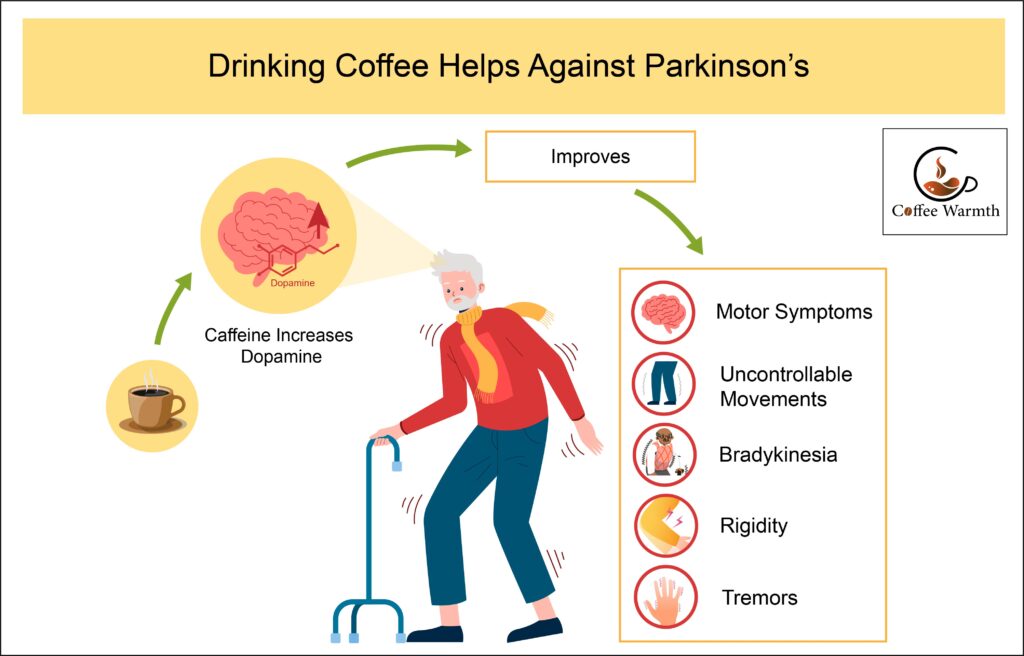
Studies reveal that only caffeinated coffee helps against Parkinson’s as caffeine is the main compound increasing dopamine levels.
14. Protects against Dementia
Alzheimer’s Association describes dementia as loss of memory, language, problem-solving, and other thinking abilities that interfere with daily life.
The association of drinking coffee to dementia has been studied extensively. Caffeine in coffee is a known central nervous system stimulator which antagonizes all types of adenosine receptors. Blocking the A2A adenosine receptors stops the production of amyloid-β, a peptide responsible for causing dementia. Furthermore, coffee also reduces neurodegeneration through its antioxidant capacity.
According to a review published in the Journal of Alzheimer’s Disease, 48% of the studies showed a protective effect of drinking coffee against dementia and cognitive decline. Furthermore, drinking 3-4 cups (24-32 fl.oz.) of coffee was found to be more helpful, compared to drinking less than 3 cups (24 fl.oz.) or more than 4 cups (32 fl.oz.) of coffee.
Marjo H Eskelinen from University of Eastern Finland states drinking 3-5 cups(24-40 fl.oz.) of coffee in midlife reduces dementia risk by 65% in later life.
15. Increases Muscle Growth
Muscle growth, also known as muscle hypertrophy, is an increase in size or number of individual muscle fibers. The connection between drinking coffee and muscle growth has not been established yet, but two studies suggest there is a link.
A study published in Cambric Core studied the association between coffee consumption and muscle mass in 2085 adults. They found that drinking any amount of coffee prevents loss of muscle mass. However, they suggest drinking 3-4 cups (24-32 fl.oz.) of coffee per day is protective of low muscle mass in men but not in women. This difference in genders is attributed to the low physical activity in women as compared to men. Another study in the Journal of Applied Physiology found that drinking coffee not only increases muscle strength and power but also increases muscle size. However, the mechanism behind the benefit of drinking coffee on increasing muscle growth is not known yet.
The image below summarizes how coffee increases muscle growth according to aforementioned studies.
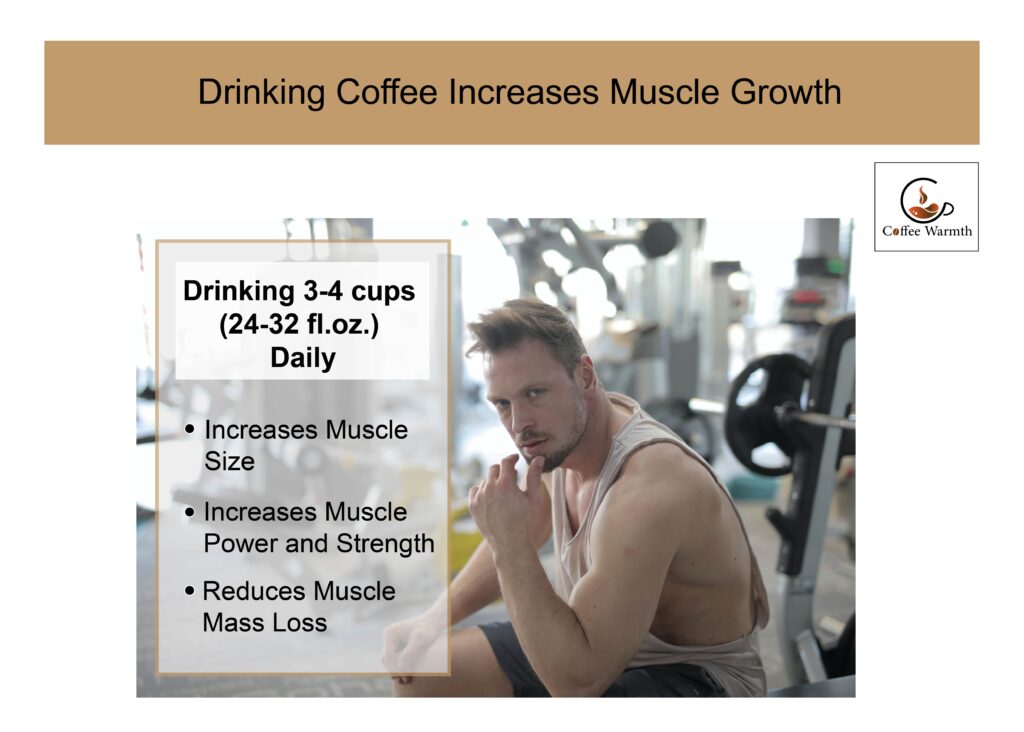
How much coffee can you drink in a day?
You can drink 4 to 5 cups (32-40 fl.oz.) of coffee or 400 mg of caffeine per day, according to the United States Food and Drug Administration as shown in the figure below.
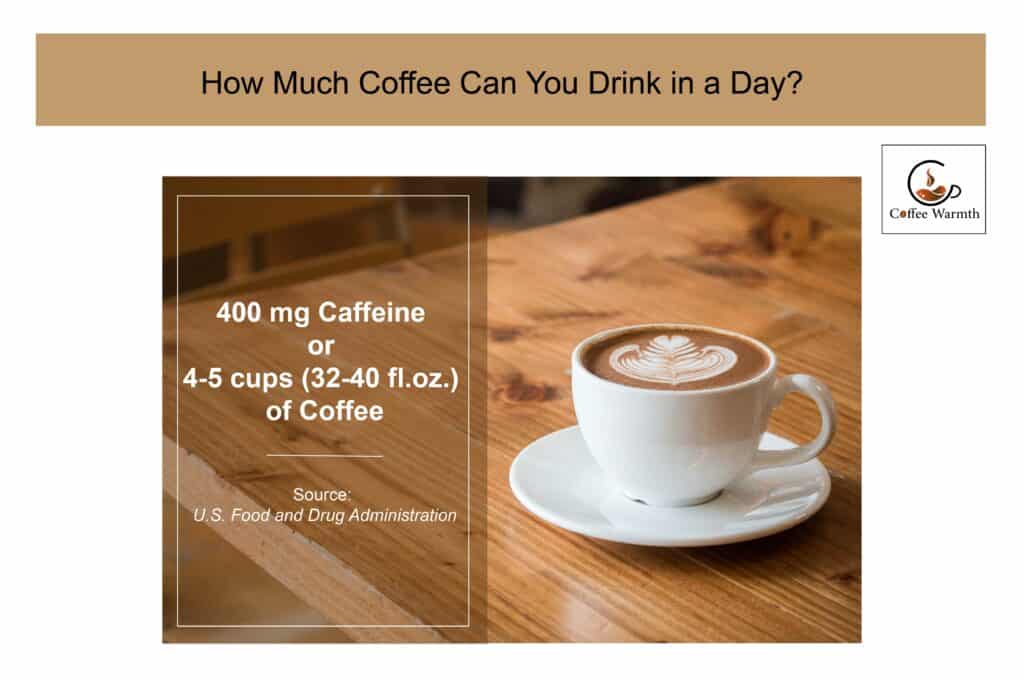
This is a safe amount for healthy adults and is not associated with side effects like headache, anxiety, insomnia, increased heart rate, or irritability. The amount of coffee to drink in a day varies for kids, pregnant females, insomniacs, and caffeine sensitive people.
How much caffeine is in one cup of coffee?
There is 95 mg or 0.095 grams of caffeine in one cup(8 fl.oz.) of coffee according to the United States Department of Agriculture. The United States Food and Drug Administration states that an 8 oz cup of brewed coffee contains 80 to 100 mg of caffeine.
However, this amount varies from 0-500 mg in different types of coffee drinks. The amount of caffeine varies because of types of coffee beans, roasting level, brewing method, and serving size.
Should you drink coffee in the Morning?
You should not drink coffee first thing in the morning, but 30-60 minutes after waking up. In the morning after waking up, your cortisol levels are at peak. Drinking coffee further elevates cortisol levels which can cause anxiety and increase stress.
However, drinking coffee in the morning between 9-11 am has many benefits. A cup of joe during this time promotes alertness, makes you poop, reduces weight, and increases metabolism.
Should you drink coffee after a Meal?
You should drink coffee 30-60 minutes after a meal. There are both benefits and risks of having a cup (8 fl.oz.) of coffee after a meal. The benefit of drinking coffee after a meal is to promote digestion. Caffeine stimulates the production of gastrin hormone which causes involuntary contractions of the intestinal muscles. Bowel movements make the poop move towards rectum for elimination.
You should not drink coffee immediately after a meal because it inhibits iron absorption according to the American Journal of Clinical Nutrition. Coffee consumption after eating binds iron and minerals like calcium, zinc, and magnesium in the food, reducing their absorption by up to 80%.
Should you drink coffee before Bed?
You should not drink coffee 0-6 hours before bed according to the Journal of Clinical Sleep Medicine.
Drinking coffee before bed causes sleep disturbances because caffeine in coffee reduces adenosine and melatonin, the hormones that are responsible for making you sleep. Caffeine in coffee has a broad half life of 2–10 hours which disturbs the sleep cycle for as long as it stays in the body. Thus, it is recommended to discontinue drinking coffee 6 hours before your sleep time.
What are the health benefits of black coffee?
Drinking black coffee stimulates the nervous system and increases adrenaline level which promotes alertness. It also enhances physical performance, elevates mood and helps reduce weight.
Considerable evidence suggests that black coffee is beneficial for reducing risk of chronic diseases like cardiovascular diseases, type 2 diabetes, cancer, liver cirrhosis, and neurodegenerative diseases like Alzhiemer’s, and Parkinson’s disease.
Is decaf coffee healthy for you?
Yes, decaf coffee is good for your health as it’s rich in antioxidants and nutrients. The benefits of drinking decaf coffee are similar to regular coffee. Decaf coffee reduces the risk of type 2 diabetes, cardiovascular diseases, liver disease, and neurodegenerative diseases. According to a study in the Journal of Diabetic Care, drinking one cup (8 fl.oz.) of decaffeinated coffee prevents type 2 diabetes in adults.
Decaf coffee is particularly healthy for caffeine sensitive people who cannot tolerate caffeinated coffee. They can attain the benefits of coffee without facing the side effects of caffeine.
How is coffee beneficial for men?
Coffee is beneficial in reducing erectile dysfunction in men. Erectile dysfunction is the inability to achieve or maintain penile erection due to limited blood flow to penis. Caffeine in coffee increases blood flow and relaxes smooth muscles in the penis. It also enhances the testosterone levels in men lowering the risk of erectile dysfunction. A study published in the American Journal of Epidemiology states that drinking 2-3 cups of coffee per day reduces risk of erectile dysfunction by 42%.
Due to antioxidant capacity and anti-inflammatory effects of coffee, it leads to reduced cell mutation and tissue damage responsible for prostate cancer development. The Journal of the National Cancer Institute found a strong inverse association between coffee and prostate cancer.
The figure below summarizes aforementioned benefits of coffee for men.
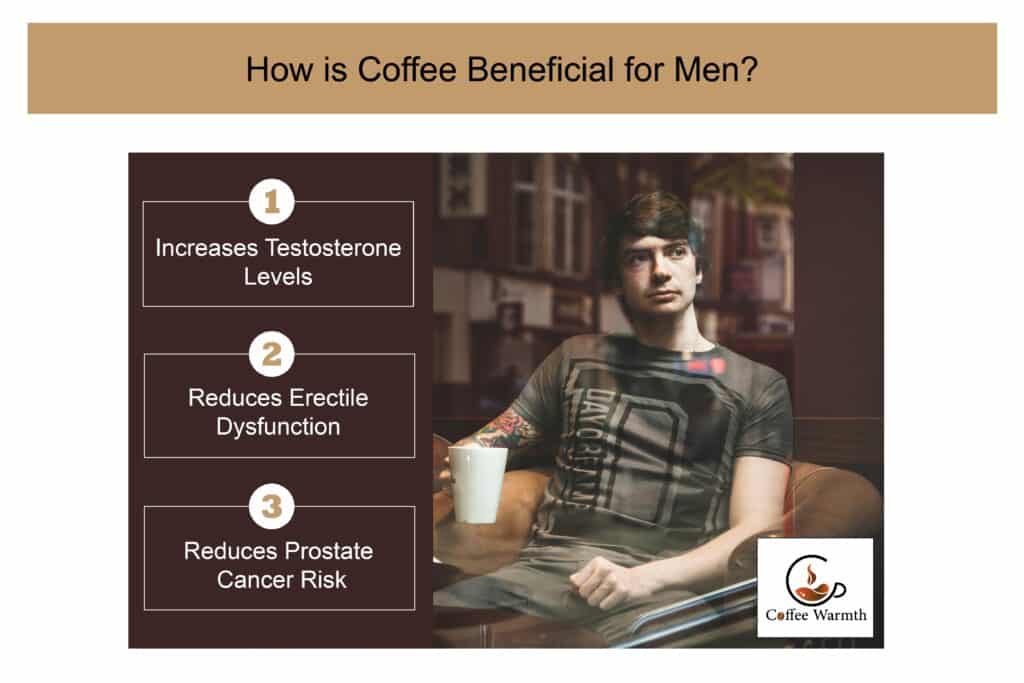
How is coffee beneficial for women?
Drinking coffee is beneficial in boosting libido in women. Caffeine is a stimulant that increases energy and alertness and increases heart rate and blood pressure. High energy levels and good mood may cause sexual arousal. So, coffee has an indirect effect on sexual desire in women.
Can kids drink coffee?
No kids cannot drink coffee according to the American Academy of Pediatrics. Children under 12 years should avoid all sorts of coffee drinks but adolescents between 13-18 years can drink 1 cup (8 fl.oz.) of coffee or 100 mg of caffeine per day.
Kids have small bodies so even small amounts of coffee can impair functioning. Caffeine in coffee can cause anxiety, sleep disturbance, increased heart rate and blood pressure.
What are the symptoms of drinking too much coffee?
The most prominent symptoms of drinking too much coffee are anxiety, restlessness, insomnia, headaches, dizziness, and increase in heart rate. Simply ceasing coffee intake can stop these symptoms. In severe cases, vomiting, dehydration, chest pain, seizures, and even death can occur. One should drink adequate amounts of coffee to gain its benefits and prevent harmful symptoms.
